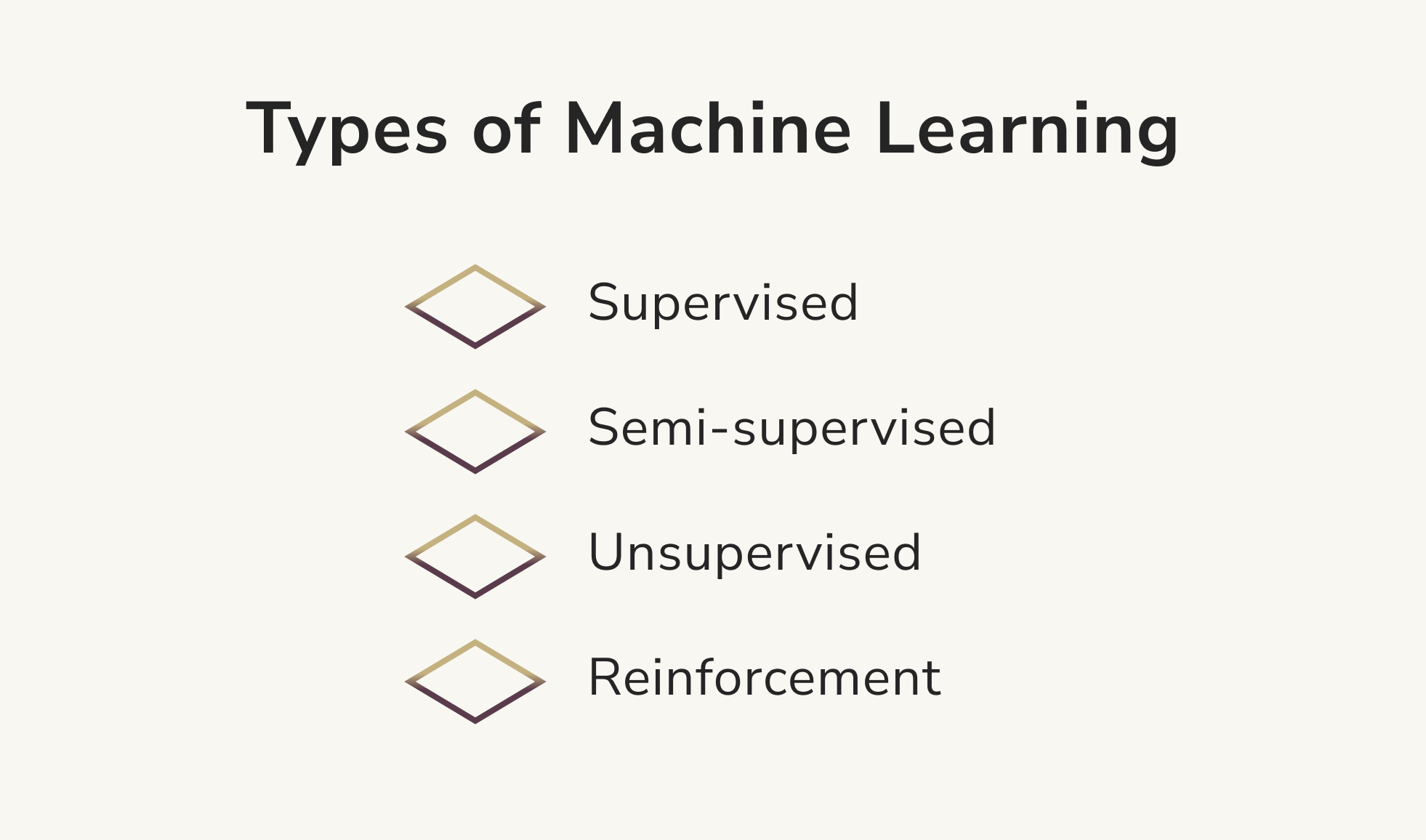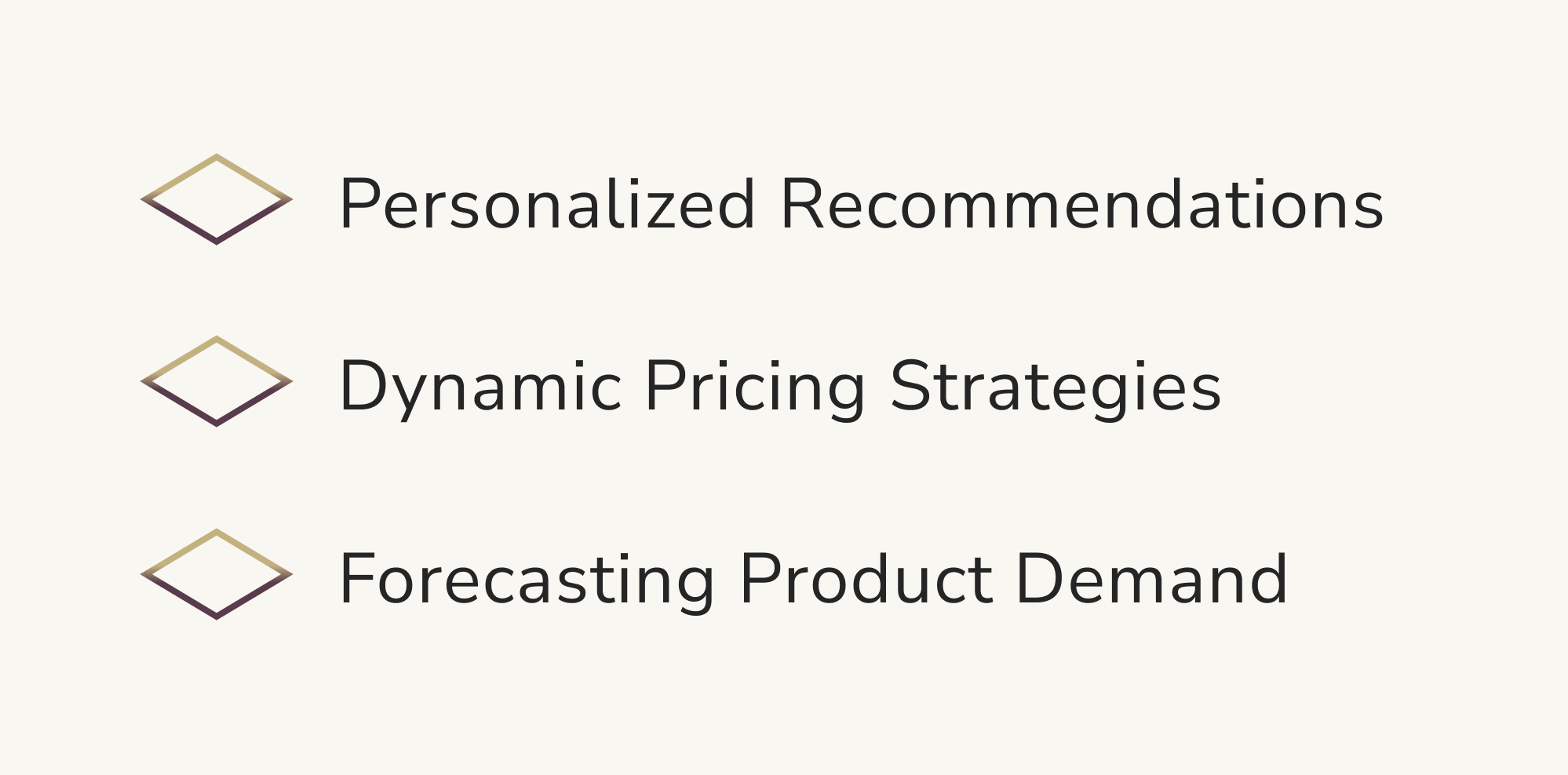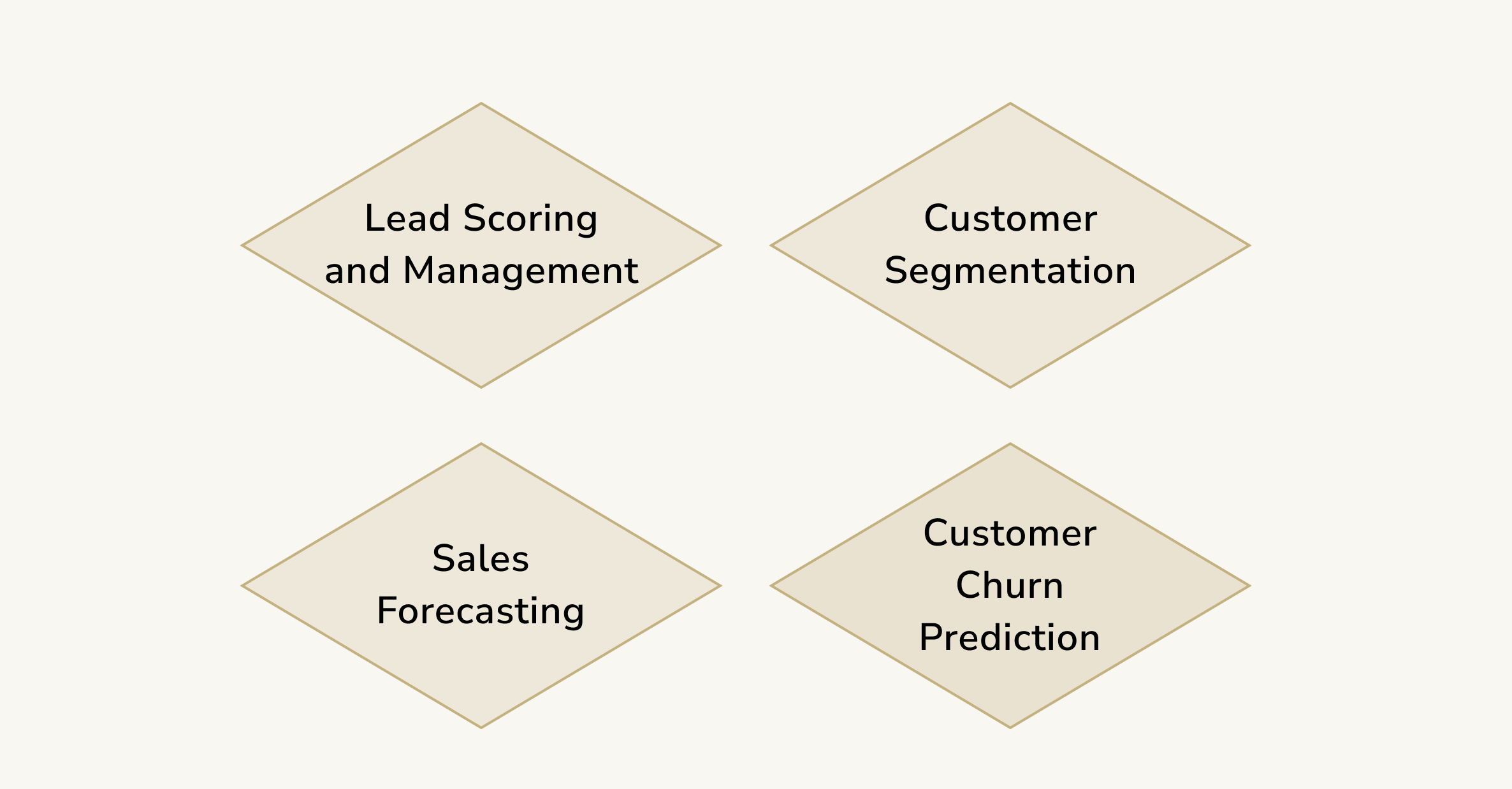Machine Learning Use Cases Across Industries

Machine learning is revolutionizing industries and businesses by enabling more efficient and accurate decision-making processes. Its ability to analyze vast amounts of data quickly allows companies to gain deeper insights and uncover patterns that were previously impossible to detect. This technological advancement is driving innovation, improving operational efficiency, and enhancing customer experiences across various sectors. By automating repetitive tasks, ML frees up human resources for more strategic roles, fostering creativity and problem-solving.
Types of Machine Learning
Before we dive into the real use cases for ML models and algorithms that might change businesses and industries across the world, let's learn about different types of machine learning.

Supervised
Supervised ML involves training a model on a labeled dataset, where the input-output pairs are known. The model learns to map inputs to the correct outputs by finding patterns in the data, and it is commonly used for tasks like classification and regression.
Semi-supervised
Semi-supervised learning combines a small amount of labeled data with a larger pool of unlabeled data. This approach leverages the limited labeled data to guide the learning process while utilizing the vast unlabeled data to improve the model's performance and generalization.
Unsupervised
Unsupervised learning deals with unlabeled data, aiming to uncover hidden patterns or structures within the dataset. Techniques such as clustering and dimensionality reduction are employed to group similar data points or reduce the complexity of the data.
Reinforcement
Reinforcement learning involves training a model through interactions with an environment, where it learns to make decisions by receiving rewards or penalties. The model aims to maximize its cumulative reward over time, making it suitable for applications like robotics, gaming, and autonomous systems.
Healthcare
For the last few decades, healthcare has been transformed by digital technologies just like many other industries. In the last few years, a few of the most discussed questions in the healthtech community are the use of artificial intelligence and machine learning in healthcare. Let’s look at a few examples of use cases of ML in healthcare:
- Drug Discovery and Development. Not only can ML make clinical trials more efficient and cost-effective by optimizing clinical trial designs, identifying suitable candidates, and predicting trial outcomes but also ML can speed up the drug discovery process by analyzing existing medications.
- Health Data Analytics. ML can analyze large datasets to identify individual high-risk patients as well as general health trends to create public health strategies.
- Operational Efficiency. Machine learning can be used to manage supply chains for medical supplies. It also optimizes staffing by predicting patient admissions.
- Epidemiological Monitoring. Early signs of epidemics can be detected by ML tools that analyze data from various sources.
- Patient Monitoring and Management. Wearable devices can be improved by machine learning algorithms that would monitor patient vitals in real time and alert healthcare providers to potential issues.
However, it should be noted that several critical considerations must be addressed to ensure ML-driven technology is effective, ethical, and safe. First of all, ethical and legal considerations that can be tackled by continuous monitoring and addressing biases in the training data and model predictions, developing models that are interpretable and can provide clear explanations for their predictions, and clearly communicating the limitations and potential risks of ML models to healthcare professionals and patients.

Secondly, data collection and security should be closely monitored. Developers have to be sure that the data used for training ML models is accurate, complete, and representative of the target population as well as anonymize patient data. It is also important to adhere to regulations like HIPAA, GDPR, and other local regulations to protect patient privacy.
Last but not least, model development and validation should be done with utmost attention. The possible risks can be mitigated by choosing machine learning algorithms that are suitable for the specific healthcare application and balancing model complexity with performance. A large and diverse dataset should be used for training and cross-validation techniques should be employed to assess model performance and avoid overfitting.
Fintech
No doubt that the numerous benefits that using machine learning offers in fintech, among which are enhanced efficiency, accuracy, and improved performance of financial services, will push the industry to actively adopt this technology. To be more precise, machine learning use cases in fintech include:
- Fraud detection. Machine learning algorithms are able to analyze transaction patterns and identify anomalies that may indicate fraudulent activity. By continuously learning from new data, these systems can detect and prevent fraud in real-time, reducing financial losses and enhancing security.
- Financial advice. By analyzing spending habits, financial goals, and market trends, ML-driven platforms offer personalized financial advice and product recommendations based on individual customer data. These systems provide tailored solutions that enhance customer satisfaction and engagement.
- Loan approval and risk management. ML models will improve loan approval processes and risk management by offering more accurate and inclusive credit scoring. ML tools can evaluate a wide range of data points, including non-traditional data such as social media activity and transaction history, to assess an individual's creditworthiness.

Overall, ML empowers fintech companies to deliver more secure, efficient, and personalized financial services, positioning them for success in a competitive and rapidly evolving market.
Cybersecurity
The topic of security has always been and will always be one of the main in software development. The latest technologies, especially machine learning and artificial intelligence, have become crucial tools in enhancing cybersecurity by enabling more effective detection, prevention, and response to threats.
- Threat Detection. DDoS attacks, unauthorized access, or data exfiltration can be indicated by network traffic analysis performed by ML algorithms. Traditional intrusion detection systems also can be enhanced by machine learning tools.
- Malware Detection and Prevention. Machine learning models can analyze the static features of files and extract features from executable files to identify malware. They can also monitor the behavior of programs and analyze behavior patterns.
- Phishing Detection. To prevent phishing, ML-powered tools can filter emails and analyze web pages to identify suspicious keywords, URLs, metadata, and the content of emails.

Integrating ML into cybersecurity strategies enables organizations to improve threat detection and response, safeguard sensitive data, and ensure the integrity of their systems and networks.
Retail and E-Commerce
Global retail e-commerce sales are estimated to exceed 6.3 trillion U.S. dollars in 2024 while worldwide retail sales are projected to amount to around 32.8 trillion U.S. dollars by 2026. No wonder that these successful industries will adopt new technologies as soon as possible.
The first use case is tailoring personalized recommendations that increase the likelihood of cross-selling and upselling. ML algorithms can analyze customer data, including browsing history, past purchases, and preferences, and deliver tailored product suggestions.
Another interesting use case is using ML for dynamic pricing strategies. During high-demand periods, machine learning models can automatically increase prices for in-demand items, optimizing revenue without manual intervention. Real-time price adjustments can be made after ML models analyze vast amounts of data, including competitor prices, demand trends, and inventory levels.

ML will be also transforming inventory management. Predictive analytics powered by ML can forecast demand for products based on historical sales data, seasonal trends, and market conditions. This helps retailers maintain optimal inventory levels, reducing the risk of overstocking or stockouts.
In the competitive retail landscape, it is crucial to understand the power of ML. Machine learning has the power not only to enhance operational efficiency but also to significantly improve the customer experience, driving growth and profitability.
Sales and Marketing
Whether a company works in B2B or B2C, its sales and marketing department can benefit from adopting various machine learning tools. They can offer actionable insights, automate processes, and personalize customer interactions. Here are the best ML use cases for sales and marketing:
- Lead Scoring and Management. Sales managers can utilize ML to prioritize high-potential leads based on their likelihood to convert by analyzing their behavior, interactions, and demographics.
- Customer Segmentation. Improved targeting and personalization are possible with segmentation based on customer behavior, demographics, purchase history, and preferences analysis.
- Sales Forecasting. By analyzing market trends, external factors, and historical sales data, machine learning models can predict future sales. Moreover, ML can aid in decision-making by analyzing data on past sales performance and market conditions and predicting revenue volumes.
- Customer Churn Prediction. With machine learning, implementing retention strategies is easier than ever. Analysis of customer behavior, feedback, and transaction history can help predict customer churn and allow companies to take preventive measures.

Properly implemented machine learning models can result in improved customer satisfaction and business performance. Drive efficiency, personalization, and strategic decision-making in sales and marketing by implementing ML.
Energy, Oil, and Gas
Global warming and climate change drive innovations in the energy sector. In this industry, machine learning (ML) tools are expected to drive efficiency, enhance safety, and optimize operations. So how exactly can it be done?
- Predictive maintenance. ML models can analyze data from sensors embedded in this machinery to predict failures before they occur. By identifying patterns and anomalies in the data, these models can alert operators to potential issues, allowing for timely maintenance and preventing costly downtime. Addressing this proactively not only avoids unexpected breakdowns but also extends the life of the equipment and ensures continuous operations.
- Improved exploration process. Exploration and production processes in the oil and gas industry traditionally heavily rely on geological surveys and manual data interpretation. These methods are usually time-consuming and prone to error. To reduce costs, accelerate the exploration process, and increase the success rate of drilling operations ML algorithms can be used to analyze vast datasets, including seismic data, geological maps, and historical drilling records.
- Energy consumption optimization. It is another critical application of ML in this industry. In order to predict energy demand, ML can analyze consumption patterns, weather data, and other relevant factors. Utilities can then optimize their supply strategies, balancing load and reducing the need for costly peak-time energy production. Similarly, consumers can choose optimal times for using appliances or charging electric vehicles based on ML-predicted energy prices and availability.

To sum it all up, the energy, oil, and gas sectors can utilize ML for predictive maintenance, enhanced exploration and production processes, and optimized energy consumption. These applications will potentially not only drive operational efficiencies and cost savings but also contribute to safer and more sustainable industry practices.
Machine learning is transforming industries by enhancing efficiency, accuracy, and innovation. In healthcare, it improves diagnostics and personalized treatment plans by analyzing vast datasets. The energy sector benefits from optimized resource management and predictive maintenance. E-commerce and retail are revolutionized through personalized recommendations and inventory management. In marketing and sales, ML enables targeted campaigns and customer insights, while fintech sees advancements in fraud detection and risk assessment. Cybersecurity is bolstered by ML's ability to detect and respond to threats in real-time, ensuring robust protection.
However, the integration of ML also poses challenges, including the need for skilled talent and addressing ethical concerns. Ultimately, businesses that embrace ML and adapt to its evolving capabilities will gain a competitive edge in the rapidly changing market landscape.

Andriy Lekh
Other articles